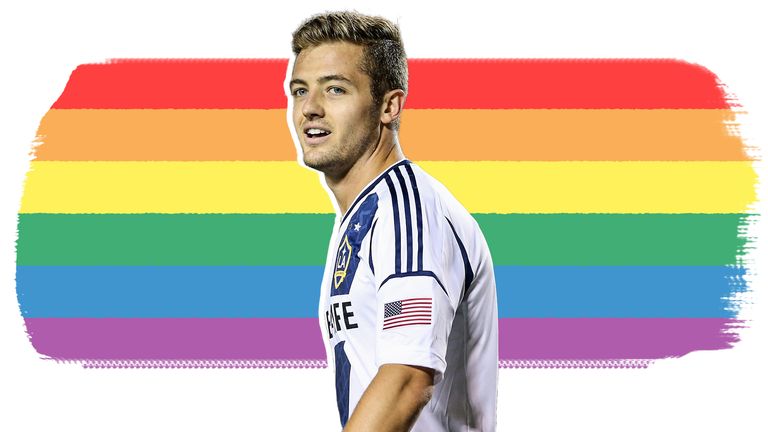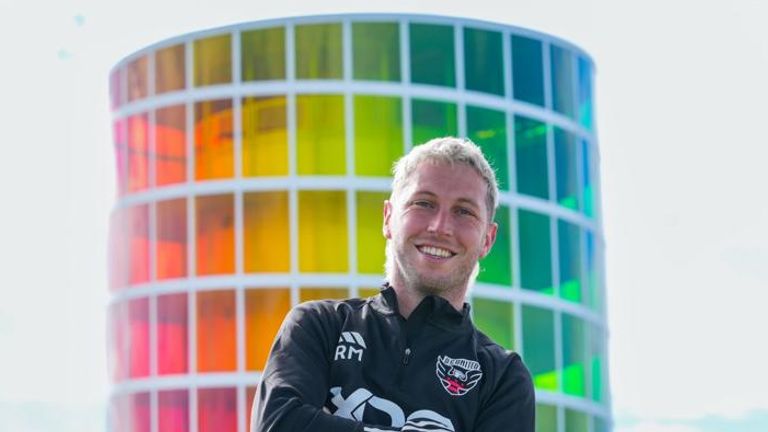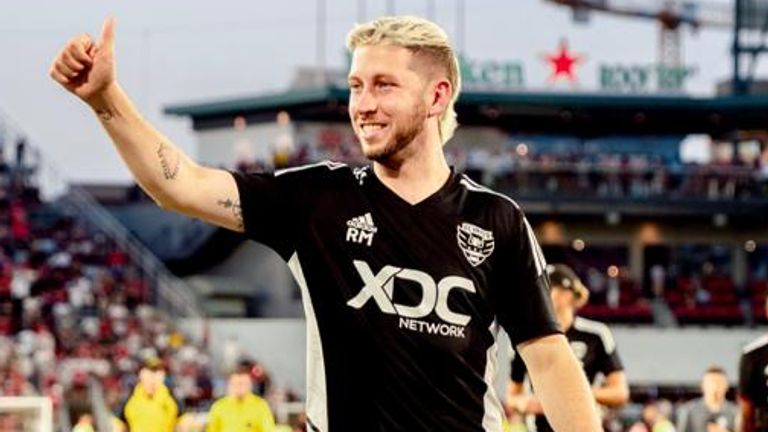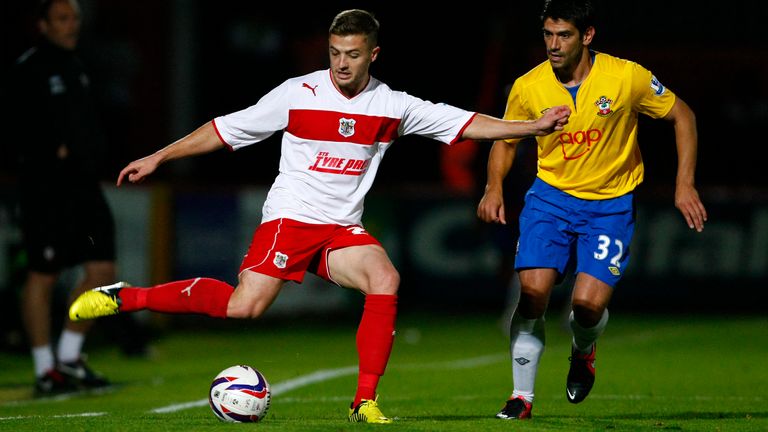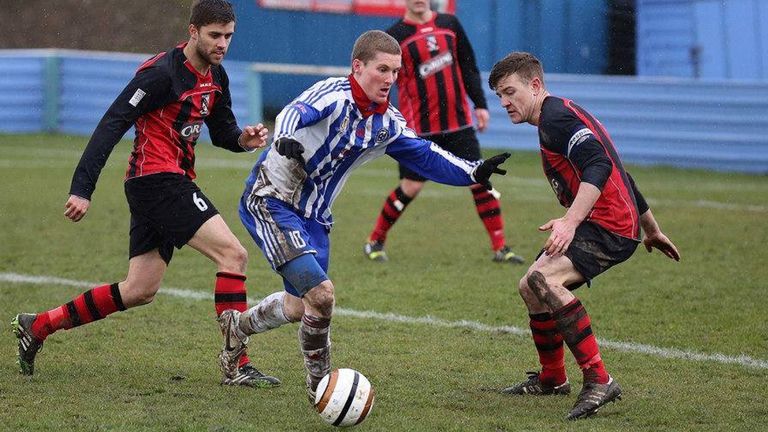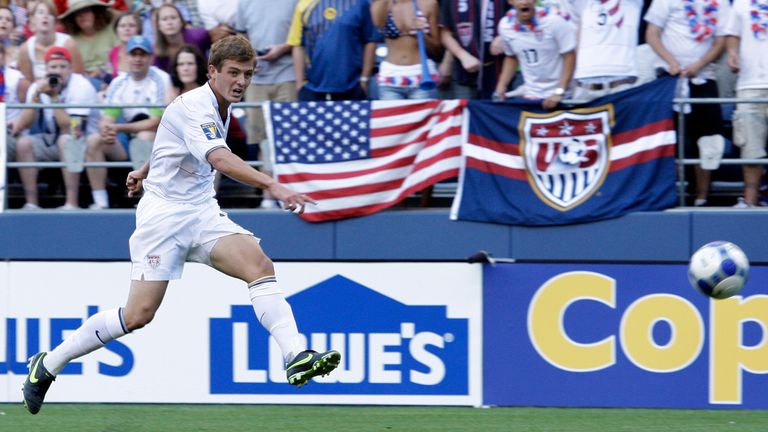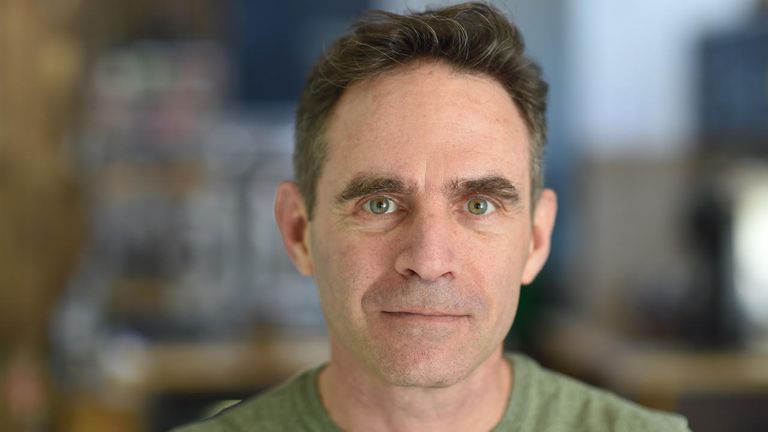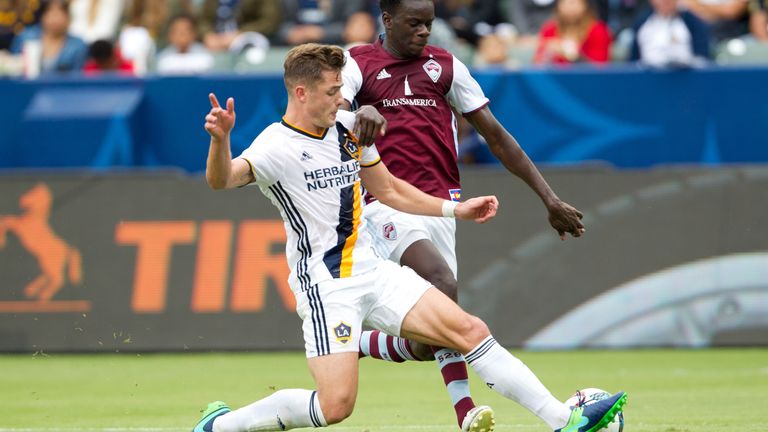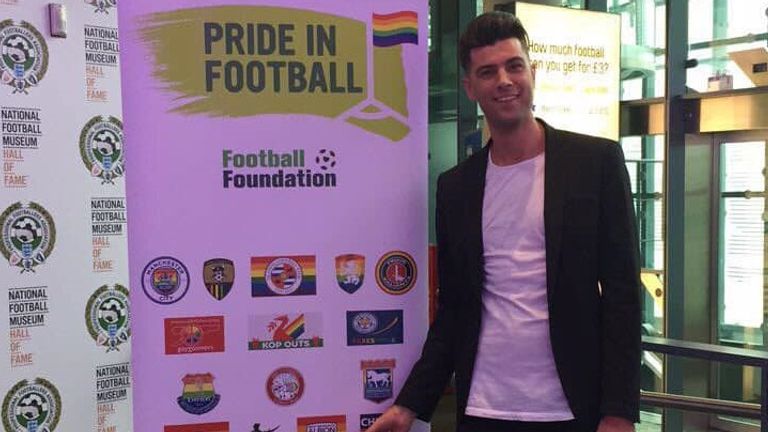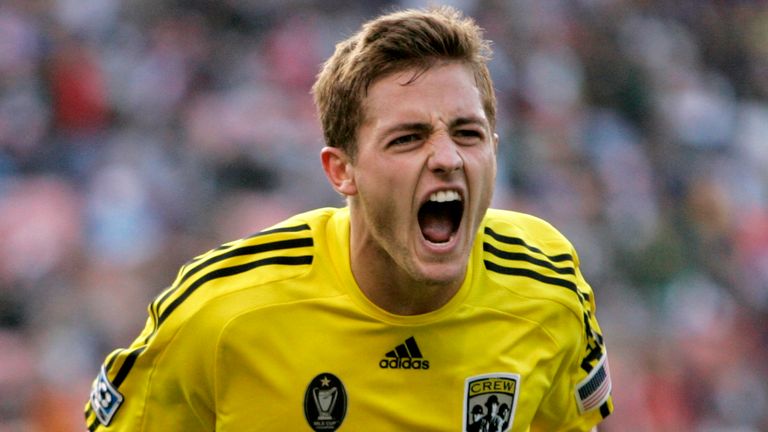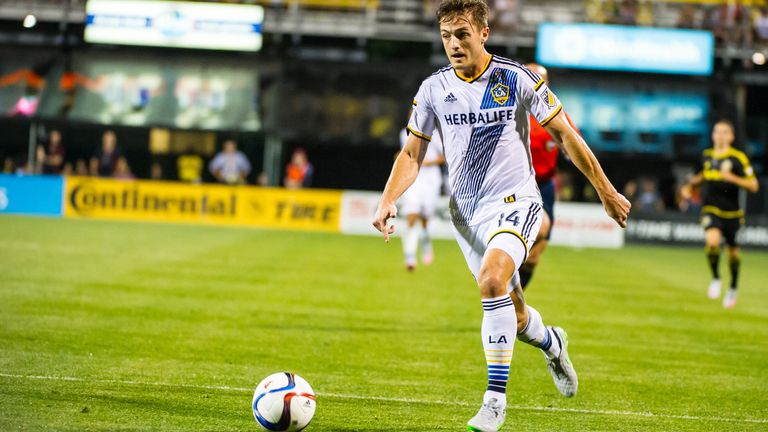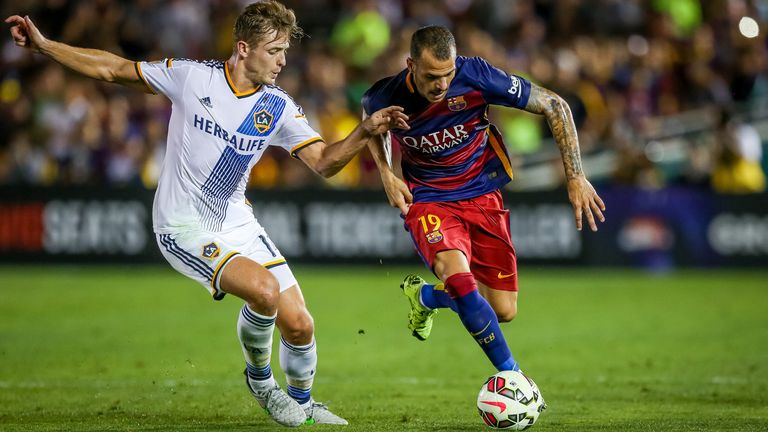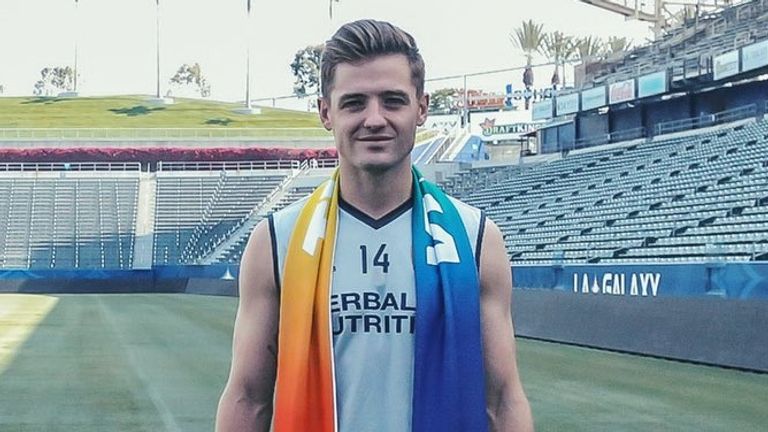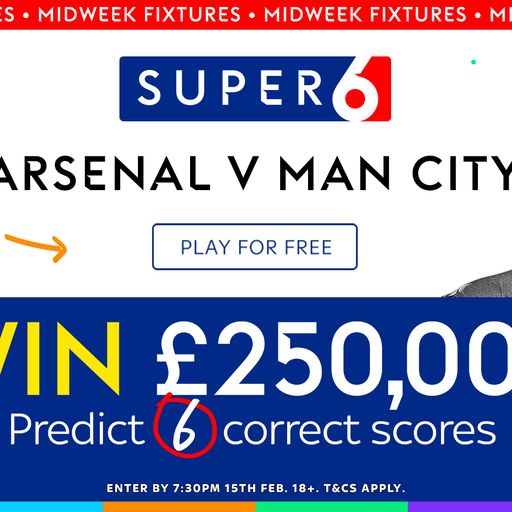LGBT+ History Month: The 'letter of life' - how Robbie Rogers' coming out 10 years ago liberated others
"Getting some s*** off my chest," tweeted Robbie Rogers in 2013, with a link to his blog; A decade later in LGBT+ History Month in the UK, players, fans, campaigners and the co-author of Rogers' autobiography explain how this moment helped turn a page in their own stories
Monday 29 January 2024 16:47, UK
"I read Robbie's letter and thought, 'This is me - I'm part of this story'."
Rory Molleda had opened up the page on Robbie Rogers' website, a blog post titled "The Next Chapter…", via a link on Twitter. Then a soccer-obsessed college footballer in North Carolina, Molleda's timeline back in February 2013 was full of tweets from players at home and abroad.
Suddenly, he felt connected to a USA international in a way that went much deeper than the standard relationship between fans and star athletes on social media.
- Czech Republic international Jakub Jankto announces he is gay
- Blackpool forward Jake Daniels comes out as gay
- Adelaide United's Josh Cavallo becomes first top-flight professional to come out as gay
"I'd watched Robbie play at the Olympics, I'd seen him with Columbus Crew before he'd left to play for Leeds, so I already knew a lot about him," recalls Molleda.
"I had just finished playing my last season in college. I'd known personally my whole life that I was different but I couldn't really pinpoint what it was.
Trending
- Newcastle gifted a third at Ipswich LIVE!
- Forest beating Brentford and moving third LIVE!
- Brighton ahead early in second half at West Ham LIVE!
- Tavernier & Hagi hit bar as Rangers seek opener vs Dundee LIVE!
- Man City beaten again at Aston Villa LIVE!
- What time are Usyk and Fury in the ring?
- Crystal Palace vs Arsenal team news LIVE!
- Usyk vs Fury 2: Epic undercard begins ahead of heavyweight showdown LIVE!
- World Darts Championship: Dobey avoids mid-match scare to win LIVE!
- EFL: Leeds, Burnley ahead | Sunderland hit back vs Norwich LIVE!
"Then along came Robbie, writing about how he didn't feel safe to be his true self in the locker room. I went down this rabbit hole of thinking about all the same experiences I'd had as a college player.
"I was instantly invested in everything about this story. It was so impactful for me."
In the blog, Rogers described his heightening fears, the power of dreams, and the heartache of being closeted. "People love to preach about honesty, how honesty is so plain and simple," he wrote. "Try explaining to your loved ones after 25 years you are gay."
Molleda read it over and over. "I couldn't believe that not only was there a gay soccer player, but here he was sharing his truth with the world."
Saved in a file called "LetterOfLife", Rogers' personal statement had sat on the desktop of his computer at home in London for several weeks before he published it online. The accompanying tweet summed it up tersely: "Getting some s*** off my chest".
His public coming out a decade ago - the first male professional footballer to do so since Justin Fashanu 23 years earlier - was headline news, a curiosity for some but a landmark moment for many others.
Molleda says it encouraged him to open up to friends and family, boosting his confidence when he began interning at DC United. The uncertain 21-year-old has since gone on to become director of team administration at the MLS franchise.
The representation provided by Rogers inspired gay players, LGBT+ fans, coaches and campaigners around the world. In his autobiography Coming Out to Play, released in November 2014, he lays out how his relationships with football, family, friends and faith were complicated by a secret he once thought he would never reveal.
Ultimately, by relinquishing it in the way he did, he helped to set others free as well. The list of out gay and bi players in the global men's professional game is still short but there have been more than twice as many public comings out since 2013. Czech Republic winger Jakub Jankto - the first active senior international in men's football to say he is gay - became the latest this week.
During what is LGBT+ History Month in the UK, Molleda is among those keen to mark the Rogers milestone. "There would have been somebody, eventually, but it happened to be Robbie," he reflects.
"We have to credit him for his bravery and how important that moment was, not only for soccer, but for gay history."
Progress and Pride
By February 2013, societal attitudes on sexuality were shifting positively on both sides of the Atlantic.
Equal marriage had yet to be enacted in either the UK or in every US state, but civil unions were relatively commonplace. What may have once been taboo was more familiar, thanks in large part to a thread of TV shows featuring gay characters - from EastEnders to Ellen, from Dawson's Creek to Skins - that pulled in wide audiences despite the occasional tangle of controversy.
There were out role models in culture, the arts, fashion and politics. Barack Obama referred to gay rights at his swearing-in after being re-elected as US President, a first for an inaugural address. Rugby's Gareth Thomas and cricket's Steven Davies had come out in British men's team sports and been widely applauded for doing so.
Men's football, however, wasn't keeping pace and appeared complacent. In 2012, only 16 out of 160 clubs in the top seven tiers of the English game had stated they would support the Football v Homophobia campaign in its Month of Action in February.
In Sweden, Anton Hysen - the son of former Liverpool defender Glenn - was the world's only out gay male footballer playing semi-professionally at that time; Rainbow Laces and rainbow captain's armbands hadn't yet been invented; and there was just one LGBT+ fans group for an English league club, the nascent Gay Gooners at Arsenal.
Set apart from all this was Rogers, living in east London while playing for Stevenage in League One on a half-season loan. The move was an attempt to rediscover form and fitness after an injury-hit start to his spell at Leeds.
However, when a hamstring tear stalled the wing-back's progress once again, he became increasingly introspective. Meanwhile, he was spending more time away from football, pursuing his interest in design and socialising with friends.
After drinks in Soho one evening, a young woman to whom Rogers had just been introduced asked casually about his sexuality. For the first time in his life, he found himself telling another person that he was gay and although it made for an awkward encounter - the woman was trying to hit on him - he was exhilarated by this "taste of freedom".
Soon, he was opening up to his older sister Alicia, who felt relief but also sadness that her brother had suffered in silence for so long. Over the course of a few weeks, she gently cajoled Rogers into emailing a letter to their mum, Theresa. When he finally sent it, she Skyped him straight back and told him how much she loved him.
His other siblings, also back in the States, said the same when they heard his news. He told around 20 friends, including former team-mates, all of whom were happy for him. He met a guy who became his first boyfriend.
Life was now accelerating. When a member of Stevenage's then coaching staff used a homophobic slur in a misguided attempt to motivate his players, Rogers decided it was time to move on from football. He let his loan spell expire and instructed his agent Shaun Higgins - also a close friend - to get his Leeds contract cancelled.
A month later, with a mentality that now there really was nothing left to lose, Rogers let his "LetterOfLife" go live.
Catalyst for change
"For the past 25 years I have been afraid, afraid to show whom I really was because of fear. Fear that judgment and rejection would hold me back from my dreams and aspirations."
Adam McCabe recognised that anxiety. Also an American player, but four years younger than Rogers, he was living in Leeds at the time on a soccer scholarship with the ambition of going pro. Much of his daily energy was spent on trying to fit in and stay focused while his secret slowly gnawed away at his confidence.
It didn't take long for Robbie's announcement to reach him. "I remember it so vividly," says McCabe. "It was the first time in my life that I thought there was somebody out there in the world like me. Somebody who understands what I'm going through. Somebody who's been on the same journey, and had the same struggles.
"I felt so proud of Robbie and I also felt seen as a human. But I also remember feeling fearful for how the world was going to react."
Across the Pennines, making his way in sports marketing, 23-year-old Piero Zizzi was similarly affected by Rogers' revelation. Despite being closeted at work and hypercautious on social media, he couldn't let the moment pass without comment.
"I'd been in Manchester for three years, and had been living with my then-boyfriend for about the same time," recalls Zizzi. "But I was nowhere near coming out to colleagues in the office. We worked in football and that was what we talked about the most.
"It was male-dominated and macho, very dog-eat-dog, and sometimes there'd be sexist and homophobic jokes. My name meant I was looked upon as this 'Italian stallion', a guy who got all the girls, some sort of lothario. I was a different person to them. I'd end up going along with the jokes just to get through it.
"It was a double life with lots of white lies and cover stories. No one I worked with ever came round to my house. I kept it all very separate. But when Robbie came out, it sparked this feeling inside of me and I just had to say something."
Zizzi gently gauged the mood and noted how nothing being mentioned about this news was particularly negative. In fact, many of these "blokey blokes" said they admired what Rogers had done, a sentiment that seemed to contradict so sharply with the jokes about being gay that they enjoyed so much.
The fact this was a footballer coming out was crucial to Zizzi. "Anybody else's story wouldn't have done anything for me. I'd been a huge fan all my life, I was now working in the sport and in all that time, I'd never had a role model I could relate to."
For now, there was still so much for both Zizzi and McCabe to unpack from the letter, particularly Rogers' description of the pain and the paradox of being a closeted player. "Secrets can cause so much internal damage… football hid my secret, [but] gave me more joy than I could have ever imagined," he wrote.
Sadly, but understandably, he also explained that he was getting out of the game. "It's time to discover myself away from football… I could not be happier with my decision."
Putting it on the page
Rogers hadn't warned his family he would be going public, and they were unprepared for the intense interest that ensued. In his desire to fully embrace freedom, he failed to anticipate the media frenzy he would cause.
But he would address this oversight later on, apologetically, in his autobiography, co-written with Eric Marcus, who had previously worked with Greg Louganis on the Olympic gold medal-winning diver's bestselling memoir of the mid-1990s.
Marcus, who is nearly 30 years older than Rogers, knew little about soccer and at first he was not as convinced as both their agents that there would be enough life experience in the footballer's story for such a book to be successful.
However, what helped to lure Marcus in was his new client was generating fresh material. After just a few months as a free agent, Rogers had accepted an offer from LA Galaxy to step back into football.
He was so well received by his new team-mates and made such quick progress with the MLS franchise, whose training base was located a short drive from the family home, that he would make his competitive Galaxy debut before the end of May, thus becoming the first out gay man to play in a major US sports league.
"The story was compelling," says Marcus. "I had some initial concerns but the fact he was playing again intrigued me.
"What also developed was the best kind of client relationship. Robbie was so easy to work with. It felt like we were older brother and younger brother."
Marcus travelled to Leeds that October to take in a game at Elland Road - a friendly woman in the adjacent seat explained all the terrace chants to him - and when he popped into a tea room in the Grand Arcade, he got more than just light refreshment.
"The owner asked me what I was doing in the city, so I told him I was writing Robbie's book and he knew who Robbie was. I explained that I was struggling to think of a title and he said instantly, 'Why don't you call it Coming Out to Play?' I couldn't have come up with a more perfect title."
When the MLS campaign was over, Rogers returned to Elland Road himself - the guest of honour for a Yorkshire derby with Barnsley - and received a warm reception from fans and former team-mates, many of whom had sent well wishes when he came out.
By the time his autobiography was published almost a year later, to strong reviews, he had enjoyed a stellar second season and was just weeks away from lifting the MLS Cup with the Galaxy.
"I saw some of the letters that came in to Robbie and they were just beautiful," says Marcus. "For many young people reading the book, it gave them this possibility to have the life they hoped to have."
Importantly, Marcus also interviewed Alicia and Theresa and included their reflections on the fallout from Rogers' tweet on that February day in 2013. "When you're closeted as Robbie was, you hurt people along the way and in writing a book like that, you get to acknowledge what you did and make things right.
"I know his mother is thrilled with how his life has unfolded. He's now a married father of two with close family relationships, he's producing films and TV shows… it's wonderful."
Coming Out to Play is still the only published English-language autobiography to date by an out gay footballer. "Robbie is so likeable and his story is important in itself, but for gay people it has great meaning. This was bigger for us gay folk than the straight folk."
A developing story
Zizzi would read Rogers' book on the train while commuting back home to Birmingham from Manchester.
"Before that point, I would never ever have read anything LGBT+ in public. Now I really didn't care what anyone thought if they saw me with this book."
It had been a present from his dad. "He'd asked what I wanted for Christmas and being 24, I didn't want much so I mentioned there was this book out. I wasn't sure he'd buy it, to be honest.
"Whenever we'd speak and be close was through football, going to West Brom games, and we'd never talk about me being gay. It was my mum that had told him for me, when I came out to family back home.
"So opening this gift on Christmas morning, I was overwhelmed with emotions. He'd gone out of his way to get the book and that in itself was symbolic because he knew it would mean a lot to me.
"It was the first time I'd felt truly accepted by him."
Zizzi would end up exchanging emails with Rogers to thank him personally. In early 2015, he updated him to say that he had come out to his colleagues and peers in sports marketing and that it had all gone smoothly.
Since then, he has founded West Brom's award-winning LGBTQ+ and allies fans group, Proud Baggies, and was a co-founder on Pride House Birmingham, the official inclusion project backed by the Commonwealth Games Federation at Birmingham 2022.
He still dips back into Coming Out to Play for occasional motivation. "It's the book that's had the biggest impact on my life.
"It's mad thinking back to the person I was before reading it and how far I've come now."
Meanwhile, for gay players who could relate to Rogers, there was always the added complications of their own circumstances and the football environments they found themselves in.
Thomas Beattie was playing in Singapore and so deep in the closet that he had deliberately disassociated himself from the topic of sexuality. That took its toll on the Yorkshireman, who had started out as a professional in Canada before moving even further from home.
"I was pretty lonely then," he says. "I'd come back from games and just feel this massive sense of solitude.
"I'd read about Robbie when he came out and it had given me a lot of comfort in the moment. But I then brushed it to the back of my mind.
"It wasn't until 2015 that I really started to go through some of the emotions and began to resonate with Robbie's journey much more."
Beattie's turning point happened to be the shock of a career-ending skull fracture sustained on the pitch.
"It was while I was recovering that I started to finally accept myself. Playing again was out of the question because of my injury, but I had peace of mind knowing there were people out there like Robbie."
By then, former Germany international Thomas Hitzlsperger had also spoken publicly about being gay, but Rogers was still providing the only visible representation out on the pitch in the men's pro game.
In a special moment, he scored his first goal for the Galaxy on the club's Pride Night in June 2015. Their title defence would end at the first hurdle of the MLS Cup playoffs.
In the following season, injuries limited Rogers' appearances and there was also an upsetting incident that reminded him why he was standing alone.
He wrote on Facebook about the previous night's game: "In the heat of the last 15 minutes, a player from the opposing team called me a "queer" repeatedly.
"I went to bed upset… sad that we still live in a time where this kind of intolerance still exists in my sport and elsewhere."
The response to the homophobic slur gave him hope, however. Rogers explained how his Galaxy team-mates and staff had instantly rallied around him and by the morning, he was even more determined to be a beacon for others.
He signed off the post with a message to his fellow gay and bi athletes: "Listen, only you know when and how it's best for you to live your truth and share your story, but each one of you that chooses to make this courageous step is not just vastly improving your own life but literally saving others."
Across the country at DC United, where Molleda was by now out, proud and a valued member of staff, a 21-year-old midfielder Collin Martin was further along on his own journey towards visibility.
"Robbie's coming out had come at a time when I was desperate to know if there were other gay soccer players like myself," recalls Martin.
"Not only was I able to then admire the career that Robbie was having in MLS but I was also able to ask my DC team-mates about their experiences with Robbie as a team-mate at various levels.
"Hearing them talk about Robbie as a person and player first, while acknowledging how big of a deal his coming out was, meant the world to me. It gave me the nudge to start to confide in some of my team-mates about my own sexuality."
After being traded to Minnesota United in January 2017, Martin continued to build his confidence along with a network of allies at his new club and in the wider community. He would come out publicly via social media on the eve of Minnesota's Pride Night game in June 2018.
Rogers was among the thousands who replied on Twitter, writing: "Love this! So so inspiring, thank you Colin! Good luck this season - except against the Galaxy."
Martin smiles at the memory. He would go on to take part in Q&As with Rogers for Gay Times and for the MLS platforms - full-circle moments for a young pro footballer who had really needed a role model.
"Robbie's coming out definitely made it easier for me and helped me get to the point where I felt I could share my news too.
"The milestone that makes Robbie's news special was that he was still playing. He gave all gay kids looking up to him and wondering if they could play the sport they love at the highest level, an example that it is possible."
The education effect
An LGBT+ and allies fans group called "Marching Out Together" was set up at Leeds United in 2017, with the full backing of the club. An invitation was extended to Rogers to become its patron, which he quickly accepted.
Mish Keatman, who is on the group's committee, often hears fellow members referring to Coming Out to Play and how they have felt such a specific sense of solidarity with their former player since that February day 10 years ago.
"At that time, Robbie would only have had Justin Fashanu to look back on and we all know how upsetting that story was," she says.
"It was difficult back then for all of us. I'd been married to a man and had two lovely kids and I didn't come out until I was 30. Even after Section 28 was repealed, the 2000s wasn't a decade when many people felt proud to say they were gay."
The contrast between then and now is considerable. Leeds United have earned a reputation as one of British football's most progressively LGBTQ+-friendly clubs, strongly supporting 'Marching Out Together' and sponsoring Leeds Pride for a period of several years.
The 2022 parade through the city saw another step forward for the game. "Luke Ayling marched out with us at Pride - he is the first Premier League player to have done that - and we had former players Jermaine Beckford and Noel Whelan with us too.
"I looked around trying to take it all in. It's always a wonderful atmosphere but Luke being there, posing for pictures and writing autographs, made it even more special."
For the Football v Homophobia campaign, which had found clubs so frustratingly reticent to engage on the topic in the year before Rogers' coming out, new opportunities opened up that helped to embed education on inclusion at academy level.
Director Lou Englefield calls it an "absolute game-changer" because it created such a legacy of understanding. "Before then, everyone would say, 'It's the fans, they'll abuse the players, that's why gay players can't come out'.
"But Robbie showed there was so much about team culture, the language used by coaches, and the infrastructure of those playing environments as well."
At the heart of it all was someone so relatable. "What young footballers really loved about Robbie's story was that the reason he went on to play so successfully at LA Galaxy was because he could finally be himself.
"We've used it for years in our education work and it's only since Jake Daniels came out last year that we've been able to broaden it out a bit more.
"I just hope Robbie realises how influential he was in the English game. Yes, he went back to the US but the imprint of his coming out, of his autobiography, and the way he talked about the issues that he faced while growing up in the game has been massive."
Meanwhile, the Rogers ripple effect that reached other gay male athletes - Jason Collins in the NBA, Tom Daley in diving, Hitzlsperger, and later others - would also make waves in women's football too, with Casey Stoney coming out publicly in February 2014.
"Because of where the women's game is now, we tend to assume it's always been like that and that is absolutely not the case," says Englefield.
"It needed players like Casey to come out when she was still England women's captain and for that to be done in a supportive positive way to move the narrative forwards again.
"People were saying LGBTQ+ inclusion in football was all about the men's game, but we were insistent that it was about the women's game as well."
Additionally, the 2016 on-field incident in which Rogers was subjected to a homophobic slur became a teachable moment too in how to handle, challenge and report abuse. Englefield would invite academy players to consider how a closeted player would internalise such a comment and how that could make them even less secure in their identity.
With Blackpool's Jake Daniels - still playing at academy level - having spoken last year about his struggle with his sexuality, there is now a teenage footballer to empathise with too.
"For young men today who don't feel able to be themselves in those environments, they can now look to Jake as well. And the fact it's taken almost 10 years for a player to not just come out in the English leagues but to also carry on playing is really quite something."
When clarity dawns
Towards the end of his blog post in February 2013, Rogers writes about the future with enormous optimism.
"Life is so full of amazing things. I realized I could only truly enjoy my life once I was honest. Honesty is a b**** but makes life so simple and clear."
When Molleda got to the same stage a few months later, he experienced the exact same emotion.
"I was like, man, I wished I could have lived an open life earlier but that's not how it goes," he says.
"All you can do is make the best of it when you do come out and that's the case with Robbie.
"Above all else, he was always doing it with the idea of being the representation and the visibility for the community. He never hid away again, which is probably the most important part of his whole journey."
Football is right to celebrate Rogers as a trailblazer and to thank him for taking the 'letter of life' off his laptop 10 years ago and sending it out around the world. He signs it off with gay abandon.
"My secret is gone, I am a free man, I can move on and live my life as my creator intended."
